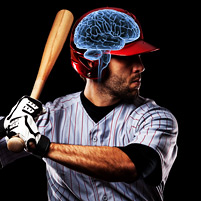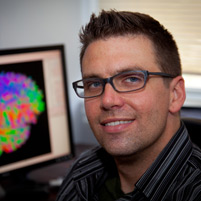Skills in Action


Timothy Verstynen
Baseball was on the minds of fans as major league ballparks across the U.S. opened for the start of the 2014 season.
That's true for Carnegie Mellon University Psychology Professor Timothy Verstynen, but in a more scientific way. He's thinking of all the information a batter must process before swinging for the fences.
That hitter must estimate where the ball will be, decide whether or not to swing, and coordinate a complex sequence of movements to get the bat at the right place at the right time, all within a single fluid movement.
This is just one example of the kind of brain activity being studied by Verstynen.
Verstynen recently received a Faculty Early Career Development (CAREER) Award from the National Science Foundation (NSF) for his project "Action Binding During Long-term Sequential Skill Learning: Computational and Neural Mechanisms."
"One great thing about the award is that the NSF is interested in basic science, in other words, setting up the foundation or the soil for fertile growth in a field without necessarily focusing heavily on where it will go," Verstynen said. "Doing core, basic science is important because you never know where it will take you."
Verstynen, who is a member of the Center for the Neural Basis of Cognition (CNBC) in the Dietrich College of Humanities and Social Sciences, will use the award to study how the brain learns complex sequential skills, such as the sequence of movements a baseball player uses when he swings or when you learn to type on a keyboard.
He will do that by using a combination of computational modeling, behavioral analysis and neuroimaging to look at how the sequences of concepts — such as the order of specific letters in words — are learned differently than sequences of actions — such as the order of key presses used to type those words.
Verstynen's findings will be used to optimize training programs for skilled learning across many domains, including educational environments and clinical rehabilitation centers.
"Working with Tim is fantastic," said CMU graduate student Kevin Jarbo (DC'14). "He is a great mentor. We work side by side as collaborators, something that I know a lot of graduate school advisers don't do with their students. Tim treats me more like a colleague than an apprentice. It's everything I could ever want from the graduate school experience."
Verstynen said there are many neurological conditions that impair skill learning, such as Parkinson's disease, that pass through the same neural systems he's studying.
"If we can see where these different areas are in the brain that represent conceptual sequencing versus motor sequencing, and if we can get behavioral signatures of their performance, then we can start to understand better how skill learning breaks down in these patient populations," Verstynen said.
"Maybe in the distant future we can develop better behavioral therapies that work around these deficits."
Related Links: Dietrich College | Department of Psychology | Center for the Neural Basis of Cognition
